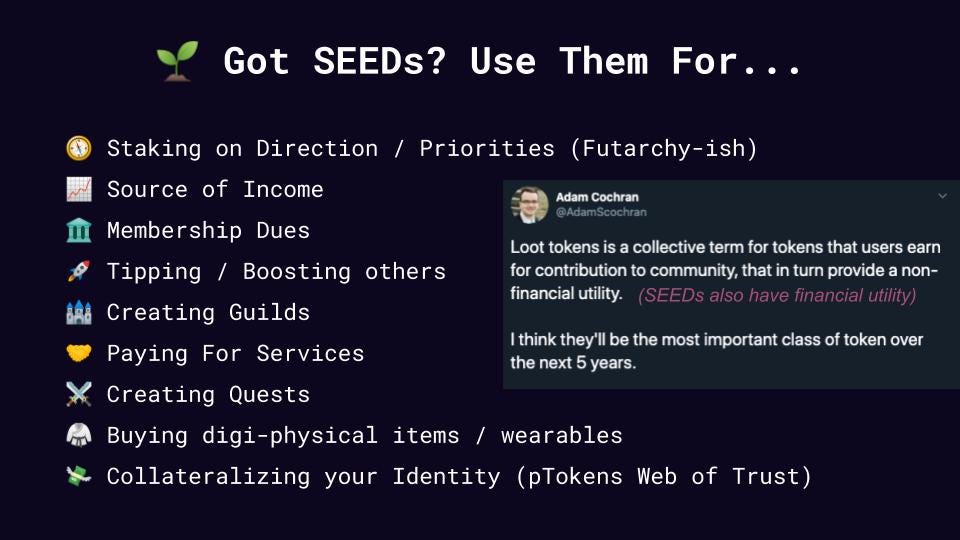In this Orgs Moving Online series I share insights and updates on the state of online organizing. Tips, tricks on Web2 and Web3 tools that community organizers all around the internet can use to efficiently run their online communities.
Hey you, welcome back to another issue of my newsletter <3
*stretches*

Last time, I shared my enthusiasm for online communities and discussed how Web3 tools can help community managers around the world organise, engage and grow their communities. This time around I want make things more concrete and tell you what’s being done today. I’ll review three of the Web3 tools in question and give examples of how they are used by communities to structure their online operations.
In his last post, Eric Chung from Abridged introduced the 'segments of DAO Ops', defined as a set of practices and tools that can be used to facilitate resource allocation, decision-making and membership administration in online communities. That’s pretty much what SourceCred, Aragon and Abridged.io do. So let’s start with these.
Aragon, Abridged, SourceCred
Aragon - Governance and Decision-Making
Aragon organisations have many different apps or features. Today though, they seem to be mostly used for two things. 1. distribute tokens to your community members. They can represent memberships, voting rights, money or all three at the same time 2. let them use the tokens to vote on things they care about.
In the context of ResearchCollective — a network of experts curating biomedical resources such as research papers, anti virals and covid testing kits —, existing members approve new members by putting their application through vote. They also use Aragon to vote on approving or rejecting scientific resources newly submitted resources to the collectively curated registry.
Similarly, SaintFame used Aragon voting to collectively approve the design of the $FAME genesis shirt submitted to community members for review by the designer Matthew Vernon. Those who have bought the shirt have now received tokens enabling them to take part in future decisions of the decentralised fashion collective.
(really cool shirt, with lots of Web3 magic printed on it, you can still buy it)

In sum, Aragon can be seen as a backbone for decision-making and governance in online communities.
Issue tokens which represent value, roles or memberships
Assign permissions for members to perform certain actions (trigger votes, move funds, install/uninstall applications)
Things to follow in Aragon: Aragon Court (much of a WIP) is a dispute resolution system that you can plug to Aragon, this should add a lot to Aragon’s utility as a governance tool. Gardens template built by 1Hive is a promizing organization template. you can browse all existing orgs on Apiary. Toolkit is a new development tool which will make building on Aragon easy and flexible.
SourceCred - Tracking and Rewarding Contributions
In World of Warcraft, guilds use sophisticated in game metrics to gauge how each player performs during epic dungeon fights. "Everyone is measured and critiqued because everything is computer mediated and we can capture all the things that are going on". Anything happening in the game can be saved, collected and analyzed.
Contrary to traditional organizations where a lot of interactions happen offline, online communities can capture a lot of what’s happening just like in WoW. SourceCred tracks events on Discourse, Discord or Github and calculates scores for contributors to thread, discussion or code repository. The SC team has adapted the PageRank algorithm Google uses to rank pages when you search for things.
The scores which come as an output scores(link) that may be used as a basis for weekly rewards. MetaGame, a cool community —also working on innovative collaboration tools— is about to use SourceCred to track contributions made by community members across all its platforms. In return, contributors earn Experience Points (XP). Based on their XP, contributors receive weekly rewards in tokens generated from an Aragon organisation. These tokens (SEEDs) will be redeemable against goods or services later down the road 👇 see for yourself.

Things to follow in SourceCred: How it works. An awesome Manifesto. Discord. Great Webinar explaining everything.
Things to follow MetaGame: Browse Ongoing projects. A cool SourceCred Graph mapping contributions made through MetaGame. MetaGame Discord.
Abridged - Onboarding and Navigation
Like stated in the introduction, the Abridged team aims to address the different segments of DAO Ops. For now, they are focusing on a bot which can be customized for your community's needs and used for many cool things. Including smooth onboarding of new members, navigating useful community resources and links, and create token permissioned chat rooms.
With ResearchCollective, we used @ResearchCollectiveBot on Telegram (ping it!) in order to onboard new members and help them navigate the ResearchCollective ecosystem. With links to main information hubs, chats and actions available.

Before that Collab19 had used the bot to collect donations and pool them in an Aragon organization, then issue donations to charities fighting against COVID-19. A nice feature of the bot is that it automatically generates an Ethereum account when the user engages with it. The only thing the user has to do is to fund his account using debit card. This abstracts quite a bit of complexity in interacting with Ethereum.
Last but not least, as an $Alex holder the Abridged bot scanned my wallet and granted me permission to access a priviledged Telegram room for $Alex holders. Try and join if you can (@ALEX_WHALE_bot ;)).

Things to follow in Abridged: Website. Chat. And finally collab.land, a very powerful tool for community organizers to deploy their own bot effortlessly, very bullish on this one. And check the newsletter.
And... Tada! Put all three together for a more organized, more efficient online community

Some background on why these things are cool
Before we part ways, I cannot resist giving a quick refresher on why these things are cool.
Online collaboration was born as early as the 1990s with internet forums. It grew rapidly and steadily with email, chat apps, social media, video apps, shared drives and work spaces... Now, it is clear that the recent sanitary crisis has given a new momentum to cyberspace and our digital lives. Boomers jumping from Zoom meeting to Zoom meeting. Gen Zers doing what they are used to, but even more. (And… You and I working remote like nothing happened!)
"Software eating the world is going through an inflection point I thought wouldn’t arrive till 2030. The pandemic has accelerated the schedule by 10 years." - In Venkatesh's words.
And so, if Zoom's stock has gone through the roof, I can tell that people working on Web3 tools have also been feeling the renewed traction. Especially those working on collaboration tools like the ones I've described above. Aragon, SourceCred and Abridged aim to help communities entirely run their operations in the digital realm. Pretty on point at a time where companies like Coinbase and Facebook are going remote.

So while the road ahead is still long, rubber has never been closer to hitting the road!

I can't wait for the day I'll work with my first non-crypto community. For the next quarter it feels like the pace of cross collaboration among crypto communities is accelerating. Probably due to the fact that tools have slowly matured and can now be tested, and also that groups like MetaCartel have been accelerating innovation through thins like DAORushWeek.
It is still early but we’ll get there! Most teams actively help new users, reach out to them if you have questions. I'm also available for discussing tools and community design practices, DM @albiverse.
References
https://ecorner.stanford.edu/in-brief/the-knowledge-economy-of-world-of-warcraft/
https://medium.com/abridged-io/summoning-the-spirit-of-dao-ops-5928ee26b9d5










Share this post